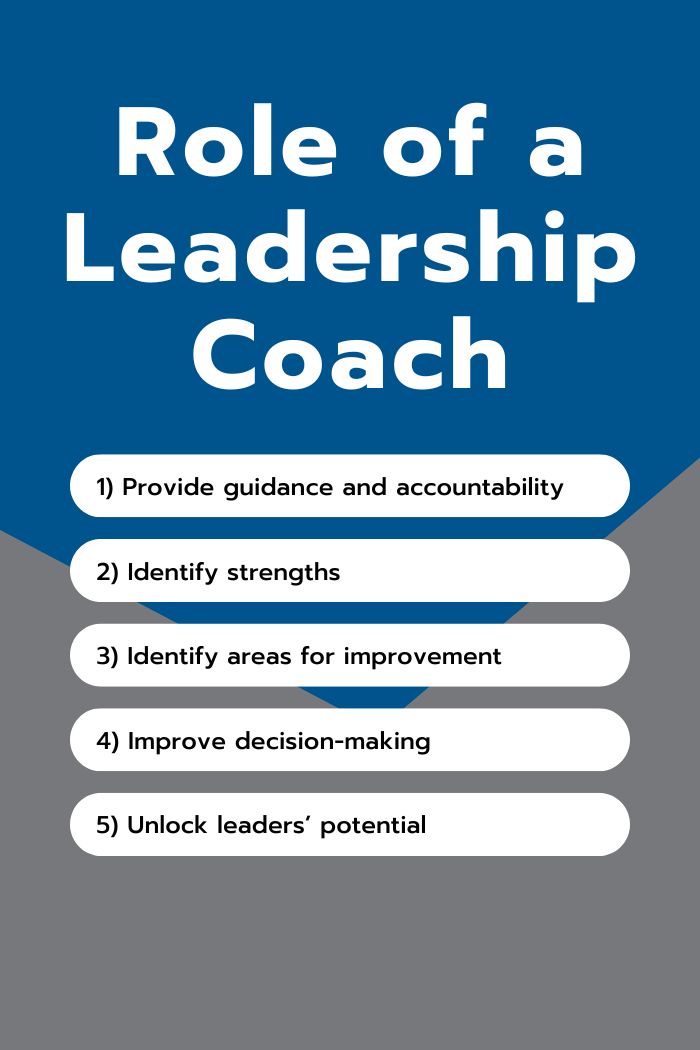The Role of a Leadership Coach in 2024: Benefits for UK Business Owners and Managers
Jump to:
-
- What is Leadership Coaching?
- The Importance of Leadership Coaching for UK Businesses
- Understanding the Role of a Leadership Coach
- The Benefits of Leadership Coaching for Business Owners and Managers
- The Impact of Leadership Coaching on Business Growth
- Selecting a Leadership Coach: Factors to Consider
What is Leadership Coaching?
Leadership coaching is a personalised development process that empowers business owners and managers to enhance their skills, improve decision-making, and drive organisational success. This article explores the importance of leadership coaching, the role of a leadership coach, and how it can transform your business.
Brief Explanation of Leadership Coaching
Leadership coaching is a collaborative process where a coach works with a business leader to identify their strengths and areas for improvement. It involves setting goals, developing strategies, and encouraging a mindset of continuous growth and development. The aim is to help leaders unlock their potential, enhance their capabilities, and achieve both personal and professional objectives.
By working closely with an experienced leadership coach, individuals can gain invaluable insights, develop strategies to overcome obstacles and acquire the tools necessary to inspire and motivate their teams.
Leadership coaching is not a one-size-fits-all solution; instead, it is a tailored experience that addresses the unique needs, goals, and challenges of each individual and their business.

The Importance of Leadership Coaching for UK Businesses
For UK business owners, leadership coaching can be a game-changer. It provides the tools and insights necessary for coping with complex challenges, inspiring teams, and driving innovation.
Whether you’re a small business owner or managing a large enterprise, leadership coaching can significantly impact your business’s success.
Effective leadership can make or break an organisation’s success. Without proper guidance and development, business owners and managers may struggle to lead their teams effectively, resulting in decreased productivity, low morale, and stagnant growth. They may also struggle to make sound decisions that align with the company’s vision and goals.
However, developing strong leadership skills is not an innate ability; it requires continuous learning, self-awareness, and a willingness to adapt and grow. This is where leadership coaching plays a pivotal role.
By working closely with an experienced coach, individuals can gain valuable insights into their leadership style, identify areas for improvement, and develop actionable plans to enhance their leadership capabilities.
Moreover, leadership coaching can help businesses overcome common challenges faced in the UK, such as regulatory changes, technological advancements, and working with an increasingly diverse and inclusive workforce. A skilled leadership coach can provide personalised guidance and strategies to address these challenges, ensuring businesses remain competitive and resilient during adversity.
Resources: 9 Trends That Will Shape Work in 2024 and Beyond
Understanding the Role of a Leadership Coach
The primary responsibility of a leadership coach is to provide guidance, support, and accountability to their clients, empowering them to develop effective leadership skills and strategies.
At the core of a leadership coach’s expertise lies a deep understanding of various leadership styles and their application in different business contexts. They may be well-versed in transformational leadership, which focuses on inspiring and motivating teams to achieve shared goals. Alternatively, they may employ a coaching style that emphasises situational leadership, tailoring their approach to the unique needs and challenges of each client.
Furthermore, a leadership coach will have a keen ability to identify strengths and areas for improvement within an organisation’s leadership structure. Through insightful questioning and active listening, they help clients gain clarity on their goals and develop actionable plans to overcome obstacles and achieve desired outcomes.
They guide clients in improving their communication strategies, being comfortable with open dialogue, and cultivating an environment of trust and collaboration within their teams. Additionally,
a leadership coach may introduce techniques for conflict resolution, enabling clients to resolve challenging situations with confidence and diplomacy.
Ultimately, the role of a leadership coach is to empower business owners and managers to become more self-aware, adaptable, and impactful leaders.

The Benefits of Leadership Coaching for Business Owners and Managers
Leadership coaching offers a range of benefits that can positively impact business owners and managers, ultimately leading to improved performance and growth. One of the primary advantages is enhanced decision-making skills. Effective leaders must make informed and strategic decisions that align with the company’s goals and values. A leadership coach can provide an objective perspective, helping leaders analyse situations from different angles, identify potential risks and opportunities, and make well-informed choices.
Improved communication is another significant benefit of leadership coaching. Strong communication skills are essential for leaders to effectively convey their vision, inspire their teams, and create a positive work environment. A coach can help leaders develop active listening skills, provide feedback on their communication style, and teach them how to tailor their messaging to different audiences.
Leadership coaching can also lead to increased productivity and efficiency within an organisation. By developing strong leadership skills, managers can improve their time management, delegate tasks effectively, and prioritise activities that drive results. This leads to increased productivity and operational efficiency, benefiting the entire organisation.
Leadership coaching also equips business owners and managers with the tools to manage stress and maintain a healthy work-life balance. Coaches can teach techniques for time management, prioritisation, and self-care, enabling leaders to operate at their full potential while avoiding burnout.
The Impact of Leadership Coaching on Business Growth
Research shows a strong correlation between leadership coaching and business growth. Companies that invest in leadership development often experience higher employee engagement, better financial performance, and stronger competitive advantages.
One of the primary ways leadership coaching contributes to business growth is through enhanced decision-making skills. Coaches work with leaders to develop critical thinking, strategic planning, and problem-solving abilities, enabling them to make more informed and effective decisions. This, in turn, leads to better resource allocation, risk management, and the identification of new growth opportunities.
It can also significantly impact a company’s bottom line by increasing productivity and efficiency. Coaches help leaders develop effective communication strategies, improve team management skills, and build a culture of accountability and collaboration. As a result, teams become more aligned, motivated, and focused on achieving organisational goals, ultimately driving increased output and profitability.
Google’s Project Oxygen is a well-documented case study that demonstrates the impact of leadership coaching. Initially started as a research project to prove that managers don’t matter, Project Oxygen ended up revealing that effective managers significantly improve team performance. Google implemented leadership coaching based on the insights from this project, leading to improvements in management quality and team performance.
Source: Harvard Business Review link.
Selecting a Leadership Coach: Factors to Consider
When it comes to selecting a leadership coach, there are several factors that business owners and managers should consider to ensure a successful coaching partnership. The right coach can make a significant difference in your professional growth and the overall success of your business.
Firstly, it’s crucial to evaluate the coach’s expertise and experience. Look for a coach with a proven track record of working with businesses similar to yours. They should have a deep understanding of the challenges and opportunities that come with your specific business environment.
Another important factor to consider is the coach’s coaching style. Different coaches may employ different methodologies and approaches, and it’s essential to find one that resonates with your learning style and preferences. Some coaches may be more direct and assertive, while others may take a more collaborative and supportive approach. Determine which style you believe will work best for you and your team.
Try to find a coach who aligns with your business values and culture. A coach who shares your company’s vision and values is more likely to understand the nuances of your organisation and provide guidance that is consistent with your goals and principles.
During the selection process, don’t hesitate to ask potential coaches about their coaching philosophy, methodologies, and success stories. A reputable coach should be able to provide you with references and testimonials from previous clients, allowing you to gain insights into their coaching style and effectiveness.
Finally, consider the coach’s availability and commitment. Leadership coaching is a long-term investment, and you want to ensure that your coach can dedicate the necessary time and attention to your development. Discuss their scheduling and communication preferences to promote a seamless and productive coaching relationship.
Conclusion
Imagine a future where your decision-making abilities are sharp and precise, your communication with your team is seamless, and your business is thriving in an ever-changing marketplace. Leadership coaching can make that vision a reality.
With a skilled and experienced leadership coach by your side, you’ll gain personalised guidance tailored specifically to your needs. They’ll share proven strategies and provide an objective perspective that can help you navigate the complexities of leading a successful organisation.
But the benefits of leadership coaching go beyond your own skills. It extends to your entire team and organisation. Improved decision-making abilities and enhanced communication skills will ripple through every aspect of your business, leading to increased productivity and efficiency.
The impact is profound. Leadership coaching empowers you to embrace change, think strategically, and make informed decisions. It’s a direct investment in the long-term success and sustainability of your business.
Ready to unlock your full potential as a leader?
Martin Baillie is a Business Coach and Growth Specialist at ActionCOACH Bury St Edmunds, committed to working with business owners to create sustainable, viable, profitable entities within the local community, and creating 1000 new jobs in the East Anglian region through that growth.
If you are looking to increase the profit in your business while freeing up time, and having a better work/life balance, there is no better time to start than now. Our business growth methodology is tried and tested, and we guarantee your results.
Contact Martin Baillie, ActionCOACH Bury St Edmunds now on Tel: 01284 334098. You can also follow him on LinkedIn, Instagram and Facebook






